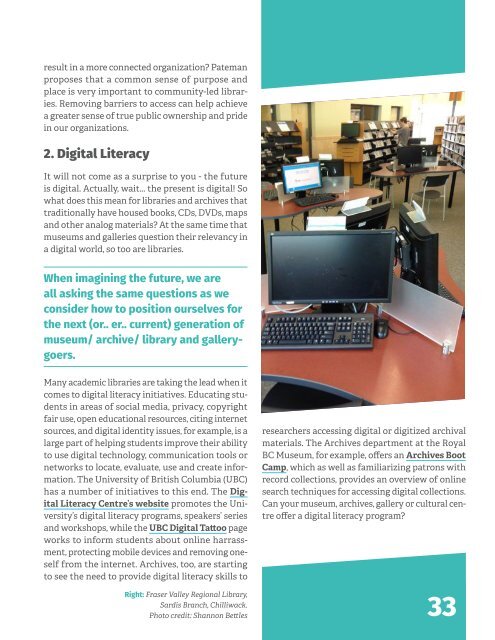Crossing Industries
2015-11-16-roundupIssue263-web-v14
2015-11-16-roundupIssue263-web-v14
Create successful ePaper yourself
Turn your PDF publications into a flip-book with our unique Google optimized e-Paper software.
esult in a more connected organization? Pateman<br />
proposes that a common sense of purpose and<br />
place is very important to community-led libraries.<br />
Removing barriers to access can help achieve<br />
a greater sense of true public ownership and pride<br />
in our organizations.<br />
2. Digital Literacy<br />
It will not come as a surprise to you - the future<br />
is digital. Actually, wait... the present is digital! So<br />
what does this mean for libraries and archives that<br />
traditionally have housed books, CDs, DVDs, maps<br />
and other analog materials? At the same time that<br />
museums and galleries question their relevancy in<br />
a digital world, so too are libraries.<br />
When imagining the future, we are<br />
all asking the same questions as we<br />
consider how to position ourselves for<br />
the next (or.. er.. current) generation of<br />
museum/ archive/ library and gallerygoers.<br />
Many academic libraries are taking the lead when it<br />
comes to digital literacy initiatives. Educating students<br />
in areas of social media, privacy, copyright<br />
fair use, open educational resources, citing internet<br />
sources, and digital identity issues, for example, is a<br />
large part of helping students improve their ability<br />
to use digital technology, communication tools or<br />
networks to locate, evaluate, use and create information.<br />
The University of British Columbia (UBC)<br />
has a number of initiatives to this end. The Digital<br />
Literacy Centre’s website promotes the University’s<br />
digital literacy programs, speakers’ series<br />
and workshops, while the UBC Digital Tattoo page<br />
works to inform students about online harrassment,<br />
protecting mobile devices and removing oneself<br />
from the internet. Archives, too, are starting<br />
to see the need to provide digital literacy skills to<br />
Right: Fraser Valley Regional Library,<br />
Sardis Branch, Chilliwack.<br />
Photo credit: Shannon Bettles<br />
researchers accessing digital or digitized archival<br />
materials. The Archives department at the Royal<br />
BC Museum, for example, offers an Archives Boot<br />
Camp, which as well as familiarizing patrons with<br />
record collections, provides an overview of online<br />
search techniques for accessing digital collections.<br />
Can your museum, archives, gallery or cultural centre<br />
offer a digital literacy program?<br />
33


